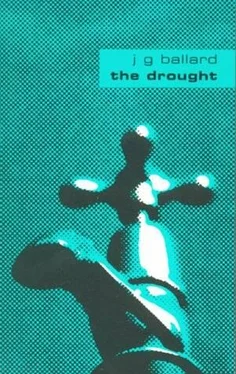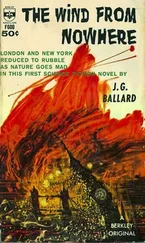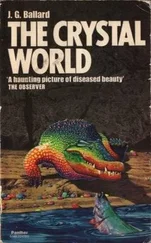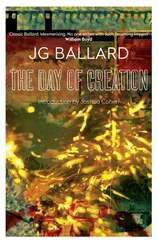Abruptly, Ransom caught his breath. Among the blank faces, partly obscured by the reflections of the buildings behind him, was a grinning head. It swam into focus, like a congealing memory, and Ransom started as a shadow moved in the street behind him.
"Quilt-!" He watched the empty streets and sidewalks, trying to remember if all the footprints in the sand were his own. The wind passed flatly down the street, and a wooden sign swung from the roof of the store opposite.
Ransom walked toward it, and then turned and hurried away through the drifting sand.
They continued their progress up the river. Pausing less frequently to rest, they pushed the cart along the baked white deck. Far behind them the embers of the burnt-out train sent their long plumes into the sky.
Then, during the midafternoon, when the town was five miles behind them, they looked back and saw dark billows of smoke rising from its streets. The flames raced across the rooftops, and within ten minutes an immense pall of smoke cut off the southern horizon.
"Dr. Ransom!" Philip Jordan strode over to him as he leaned against the shaft of the cart. "Did you light a fire while you were there? You went for a walk."
Ransom shook his head. "I don't think so, Philip. I had some matches with me-I suppose I might have done."
"But did you? Can't you remember?" Philip watched him closely.
"No. I'm sure I didn't. Why should I?"
"All right, then. But I'll take those matches, doctor."
From then on, despite Philip's suspicions that he had started the fires-suspicions that for some obscure reason he found himself sharing-Ransom was certain they were being followed. The landscape had changed perceptibly. The placid open reaches of the coastal plain, its perspectives marked by an isolated tree or silo, had vanished. Here the remains of small towns gave the alluvial bench an uneven appearance, the wrecks of cars were parked among the dunes by the river and along the roads approaching it Everywhere the shells of metal towers and chimneys rose into the air. Even the channel of the river was more crowded, and they wound their way past scores of derelict craft.
They passed below the spans of the demolished road bridge that had interrupted their drive to the coast ten years earlier. As they stepped through the collapsed arches, and the familiar perspectives reappeared in front of them, Ransom remembered the solitary figure they had seen walking slowly away up the drained bed. He left the cart and went on ahead, searching for the footsteps of this enigmatic figure. In front of him the light was hazy and obscured, and for a moment, as he tried to clear his eyes, he saw a sudden glimpse of someone three hundred yards away, his back touched by the sunlight as he moved off among the empty basins.
Chapter 12 – The Smoke Fires
This image remained with him as they completed the final stages of the journey to Mount Royal. Ten days later, when they reached the western outskirts of the city, it had become for Ransom inextricably confused with all the other specters of the landscape they had crossed. The aridity of the central plain, with its desolation and endless deserts stretching across the continent, numbed him by its extent. The unvarying desert light, the absence of all color, and the brilliant whiteness of the stony landscape made him feel that he was advancing across an immense graveyard. Above all, the lack of movement gave to even the slightest disturbance an almost hallucinatory intensity. By night, as they rested in a hollow cut into the dunes along the bank, they would hear the same unseen animal somewhere to the northwest, howling to itself at their approach. Always it was several miles away from them, its cries echoing across the desert, reflected off the isolated walls that loomed like megaliths in the gray light.
By day, when they set out again, they would see the fires burning behind them. The dark plumes rose from the desert floor, marking the progress of the river bed front the south. Sometimes six or seven fires wtuld burn simultaneously in a long line, their billows leaning against the sky.
Their supplies of water were now almost exhausted, and the failure to find any trace of springs or underground channels had put an end to the original purpose of the expedition. However, none of them mentioned the need to turn back for the coast, or made a serious attempt to dig for water in the sand. Backs bent against the cart, they plodded on toward the rising skyline of the city.
The reduction in their daily water ration made them uneager to talk to each other. Most of the time Mrs. Quilter sat tied to the back-rest atop the cart, swaying and muttering to herself. Philip Jordan, his dust-streaked face more and more lizardlike in the heat, carefully scanned the verges of the river, taking his spear and running on ahead whenever the others rested. Pushing away at the cart, Catherine Austen kept to herself. Only the cries of the animal at night drew any response from her.
On the night before they reached the city, Ransom woke to the distant howling and saw her a hundred yards from the camp. She was walking on the dunes beyond the river's edge, the dark night wind whipping her long hair off her shoulders.
The next morning, as they knelt by the fire, sipping at one of the two remaining canteens, he asked her: "Catherine, we're almost there. What are you looking for?"
She picked up a handful of the dust and clenched it in her fist, then let the white crystals dissolve between her fingers.
Surrounded on all sides by the encroaching desert, the city seemed to have drawn in upon itself, the ridges of brick and stone running off into the sandhills. As they neared the city, the burnt-out roofs rose above the warehouses by the dockyards. Ransom looked up at the wharfs and riverside streets, waiting for any signs of movement, but the roads were deserted, filled with sand like the floors of canyons. The buildings receded in dusty tiers, transforming the whole place into a prehistoric terrace city, a dead metropolis that turned its forbidding stare on them as they passed.
Beyond the outskirts of the city, the riverside towns had vanished. Huge dunes sloped among the ruined walls, pieces of burnt timber sticking from the smooth flanks. Philip Jordan and Ransom climbed onto the bank and looked out across the causeways of rubble stretching away like the foundation stones of a city still waiting to be laid. Here and there the remains of a shanty leaned against a wall, or a small group of buildings stood alone like a deserted fort. Half a mile away they could see the curve of the motorbridge, and beyond it an indistinct series of earthworks that marked the remains of Larchmont.
Ransom stared out at the lake. Where the open water had once been, a sea of white dunes stretched away toward. the horizon, their rolling crests touched by the sunlight. Ransom waited for them to move, the soft waves sweeping across the shore. The symmetry of the dunes, their drained slopes like polished chalk, illuminated the entire landscape.
Shaking his head at the desolation around him, Philip Jordan muttered: "There's no water here, Ransom. Those fires were an accident. Quilter, everyone, they're all dead."
Ransom looked back at the dark plumes lifting into the sky behind them. The nearest was only half a mile away, burning somewhere by the harbor authority wharf. "Philip, there must be someone. If they're here, there'll be water."
Below them, Catherine Austen leaned against the side of the cart. Under her awning Mrs. Quilter rocked like a child from side to side. Philip began to walk down to them when a harsh barking crossed the air from a two-story building a hundred yards from the bank.
Philip crouched down behind a section of metal fencing, but Ransom beckoned to him. "Philip, come on! Those dogs are given water by someone."
Читать дальше
Конец ознакомительного отрывка
Купить книгу








